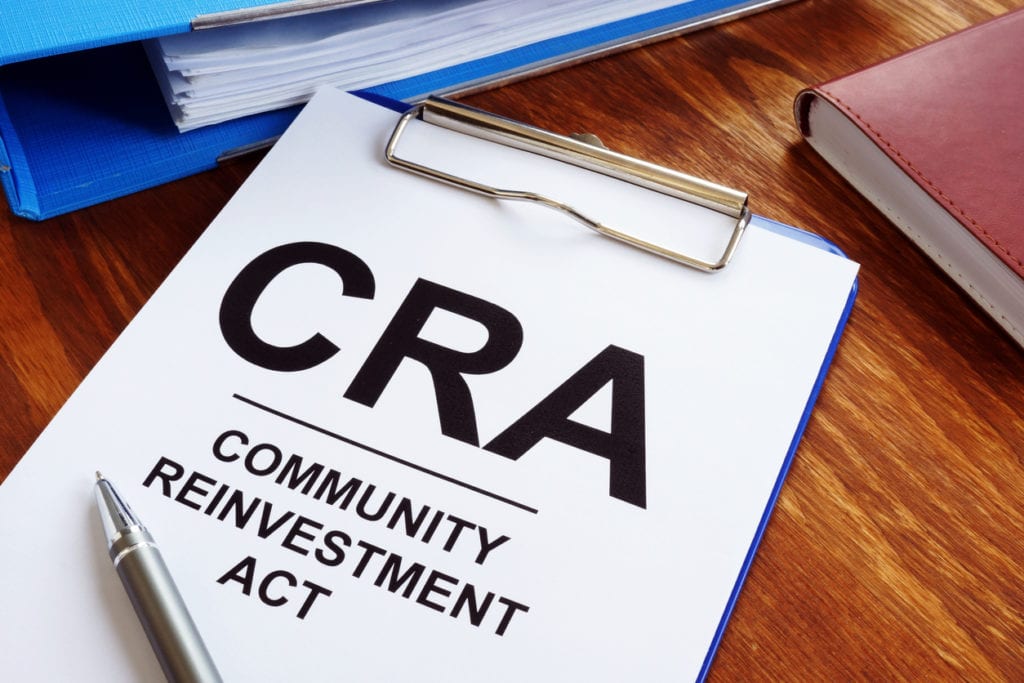Minding the pandemic, election and social issues is a lot to focus on but bankers will have to add the Community Reinvestment Act (CRA) to their full plates. There are three hot CRA topics on which to focus since CRA is still very much on the regulatory agencies’ minds. Despite 2020 upending CRA lending programs, regulators continue to evaluate financial industry performance on meeting assessment area credit needs.
OCC Final CRA Rule
Forging ahead without uniform rule making, the OCC issued its final CRA rule in May 2020 effective October 1, 2020. The kickoff dates are 2023 for large banks and 2024 for other OCC banks. By acting early, the OCC has triggered two sets of CRA rules. Being first gives the OCC the upper hand in negotiating a uniform CRA rule with the Federal Reserve, FDIC and NCUA. However, OCC banks cannot count on whether its agency’s rule will be rescinded or drastically changed. This puts OCC banks in an awkward position of having to start making compliance plans without the certainty that the current rule will exist as it is written. However, because the OCC CRA compliance provisions are starting new, OCC banks need to give attention to the major changes and start thinking about drafting an action plan.
The kickoff dates mean that bankers will have to put a new CRA program into effect long before the these start dates to be able to collect and adhere to the new rules.
Recommendations OCC bank should consider now:
- Review the new rule and determine bank size and requirements.
- Review the core system to ensure it can capture geocoded data for deposits and loans.
- Review the core system to ensure it can record revenue data for small business loans.
- Review deposit and loan data mapping to determine if the bank’s assessment area is appropriate; and
- Review acceptable community development activities and be able to capture this data for community development loans, community development investments/donations and community development services.
Here is a link to the OCC final CRA rule:
https://www.occ.treas.gov/news-issuances/federal-register/2020/nr-occ-2020-63a.pdf
Banks are asking what they should do if they are not an OCC Bank? These banks should stay the course as noted in the CRA guidance provided by the FDIC and FRB regulatory agencies as well as NCUA. But in all likelihood the agencies will require enhanced data gathering of loans and deposits. Therefore, as a best practice it may be beneficial to start geocoding all your loans and deposit accounts. This will allow the bank to understand where their loans are being originated and where their deposit accounts are located. Moreover, the data and maps may trigger current CRA assessment area changes.
Regulators and special interest groups want to make sure lending is occurring where deposits are gathered.
Paycheck Protection Program and Loan Servicing
In this COVID-19 unprecedented pandemic time, banks adjusted to accommodate community financial needs. An example is the Paycheck Protection Program (PPP) that was created under the auspice of the Small Business Administration to assist small businesses through the economic shutdown. PPP lending moved so swiftly there was not much lending regulatory guidance. Additional guidance filtered down later which resulted in banks not capturing all the information at the time of consummation.
Right now, banks undergoing or scheduled for their CRA Performance Evaluations are being asked to provide information regarding originated PPP loans and other accommodations made during the pandemic. The regulators are asking for the list of originated PPP loans including geocodes and the business revenues.
In addition, many banks implemented processes to assist borrowers who found themselves in economic hardship as a result of shutdowns. The Bank developed process for deferments, modifications, and rate reductions.
As guidance started to come out on the handling of PPP and servicing on loans, many banks found themselves with uncollected data. As a best practice, a bank should ensure all the PPP loans have been geocoded and if possible, obtain their revenue. If the core system does not have fields to enter geocodes and revenue, the next best thing is to record the data onto a spreadsheet to assist with reporting purposes. Review the data regarding how the bank penetrated low- and moderate- income census tracts.
In addition, banks that made accommodations, such as deferments, modifications, or other processes to assist with borrower hardship should have written procedures/processes to ensure fair and equal treatment. Examiners are looking for records of these accommodations, such as income and geocodes, to show where such arrangements were made. Collecting this information is encouraged since it will give banks to ability to identify the number and categories of borrowers that were assisted in low- and moderate-income geographies. This data should result in the CRA credits. The more detailed the information, the easier it will be for the regulators to make a judgment on the qualification of these activities for CRA.
The regulators are integrating this data into the CRA performance evaluation and noting how a bank responded to its community during this pandemic.
See following link to Ballard Spahr LLC which provides access to guidance from all federal regulatory agencies and related resource regarding COVID-19 and financial banking:
Racism – Diversity, Equity, and Inclusion
Lastly, race is being discussed in communities regarding diversity, equity and inclusion. TCA found that the American Bankers Association has started a monthly collaboration conference call that is free for attendee to discuss these topics and how they will impact CRA.
The link to register for the next meeting follows:
https://www.aba.com/training-events/conferences/diversity-equity-inclusion-summit
TCA has attended this event and found it informative as it creates an opportunity for bankers to network with other bankers to discuss these serious issues.
To discuss these topics further, contact TCA and we can also assist with geocoding loans or deposits. Please call 800.934.REGS. TCA is here to help your Bank to find A Better Way with CRA.






